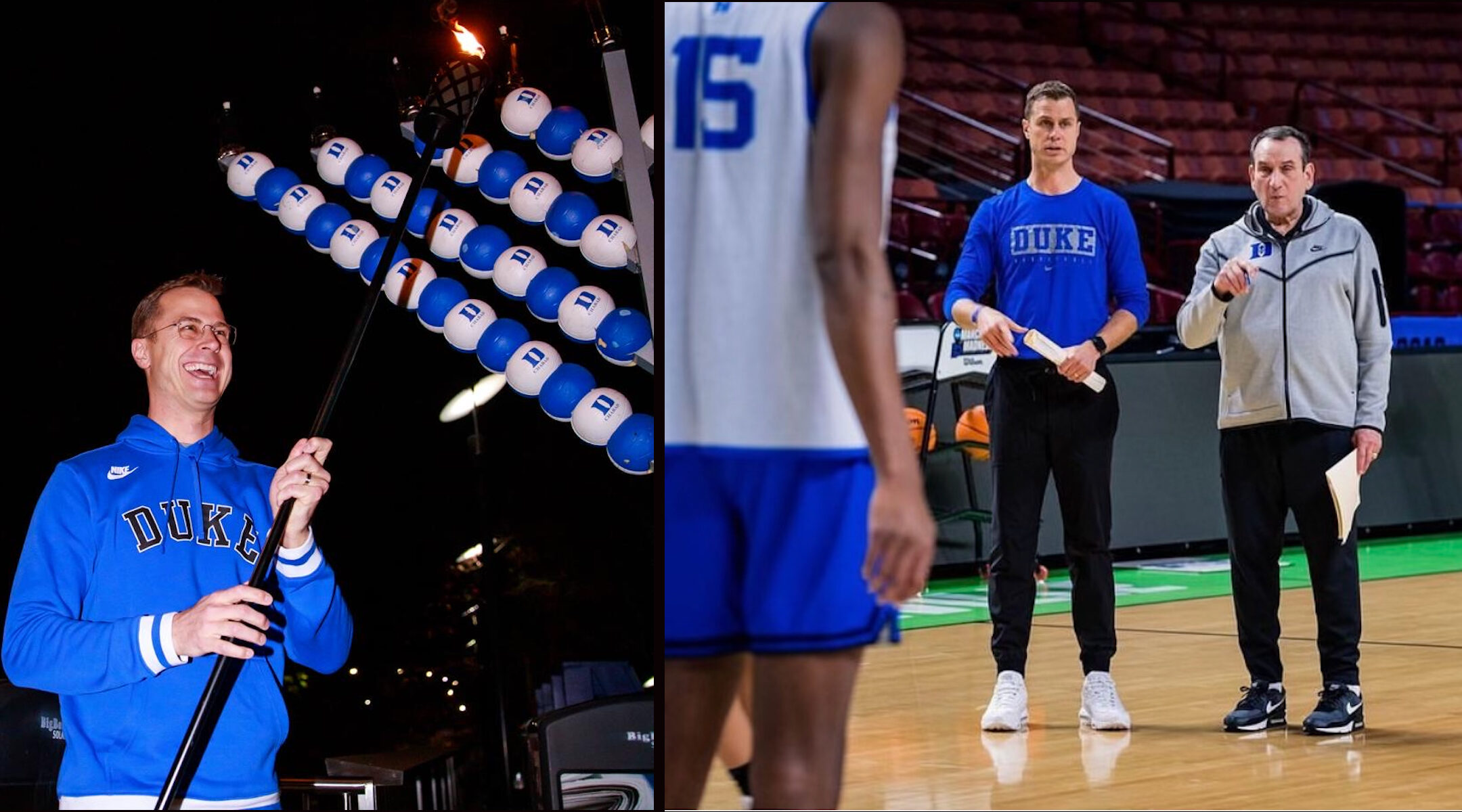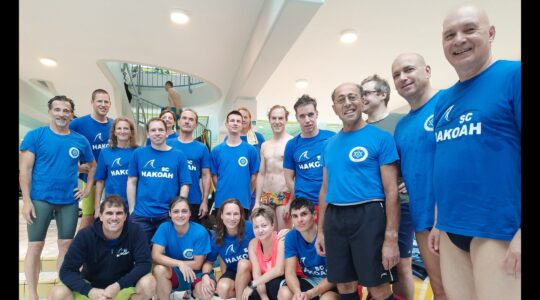(JTA) — Dylan Geller has taken great pride in his work as a student manager of Duke University’s men’s basketball team since landing the gig as a freshman in 2019. But things felt different this season, and not just because the Blue Devils had a new head coach, Jon Scheyer, after 42 years under the legendary Mike Krzyzewski.
“Coach Scheyer is such a role model to me, being a young Jewish man myself with aspiring hopes and dreams in basketball,” said Geller, a senior from Fort Lauderdale, Florida. “Seeing him do it so successfully, he’s definitely been a big inspiration.”
Starting Thursday night, Scheyer, 35, will lead the Blue Devils through the head-spinning Division I tournament known as March Madness, which raked in an average 10.7 million TV viewers per game last year. Ranked No. 5 in its division, Duke will face off against the Golden Eagles of Oral Roberts University, an evangelical Christian school in Tulsa, Oklahoma.
If the Blue Devils go all the way in this year’s Division I tournament — as the team has done five times in the past, most recently in 2015 — Scheyer would be only be the third Jewish coach to do so, and the first in more than three decades. (Nat Holman led the City College of New York to an NCAA championship in 1950; Larry Brown did so with the University of Kansas in 1988.) He would also be only the sixth Jewish men’s basketball coach ever to reach the Final Four.
Scheyer is ending his first season as Duke’s head coach with a 26-8 record, becoming the most successful first-year coach in the school’s history.
Duke students are famous for their fandom, earning the moniker “Cameron Crazies” from their antics in the stands of their school’s Cameron Indoor Stadium. But for Duke’s substantial population of Jewish students, faculty and graduates, the intensity is heightened by knowing that the most influential figure on the Durham, North Carolina, campus is a fellow Jew.
“At Duke, these people are celebrities,” said Sophie Barry, a former president of the Jewish Student Union who graduated last May. “It’s a national stage, people are watching them on ESPN all over the place, and they’re just walking around on our campus. It’s such a big deal. And as Jewish people, we can’t help getting all excited when a celebrity is Jewish.”
So devoted to basketball that he made the sport his bar mitzvah theme, Scheyer earned the nickname “Jewish Jordan” when he was growing up in the Chicago suburb of Northbrook, Illinois. (Michael Jordan played for the Chicago Bulls during Scheyer’s childhood there, after winning a national title for Duke’s rivals, the University of North Carolina Tar Heels.) He led his high school team — with an all-Jewish starting lineup — to a state championship in 2005.
Scheyer then played for the Blue Devils from 2007 to 2010, helping the team win two ACC championships and one NCAA title. A history major, he also volunteered in a literacy program and starred in an improv group’s video in which he bikes to the campus Hillel, wears a tallit and spins a dreidel. After a devastating eye injury thwarted Scheyer’s ambitions in the NBA, he obtained Israeli citizenship and played one ultimately disappointing season for Maccabi Tel Aviv.
“I felt proud to be Jewish living in Israel, and you realize there’s not a lot of Jews in the world, and that only strengthened my beliefs,” Scheyer said during a conversation with Jewish students in 2015, shortly after he returned to Duke as a member of the coaching staff.
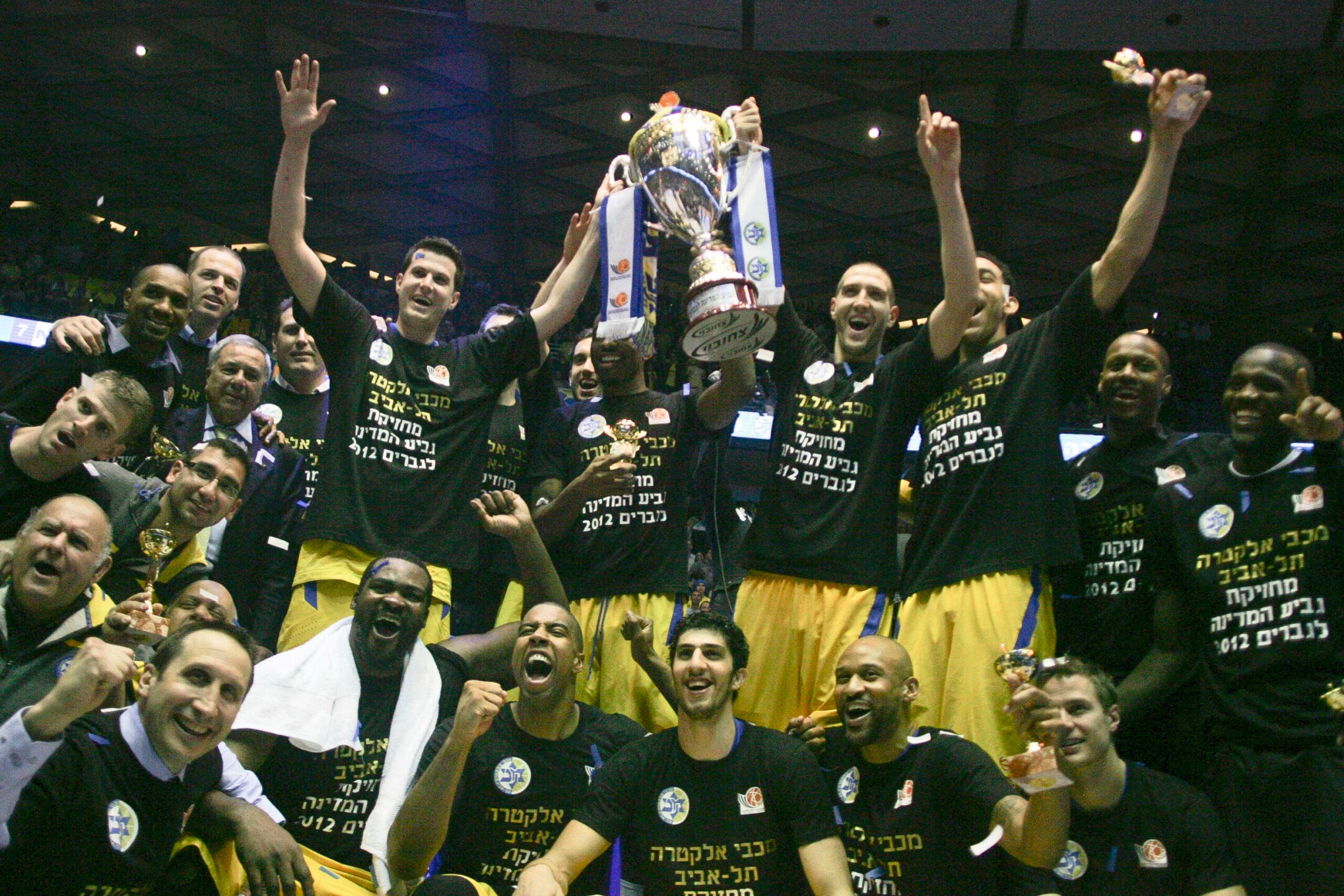
The Maccabi Tel Aviv basketball team after winning the Israeli Basketball Super League championship, Feb. 16, 2012. Jon Scheyer played on the team that season. (Flash 90)
Scheyer was picked for the top coaching spot last year, taking on the daunting job of succeeding Krzyzewski, known as “Coach K,” who built a dynasty in the world of college basketball. Along with guiding the Blue Devils to five national championships, Krzyzewski amassed a total of 1,202 head coaching victories in his 47-year career — 42 of those at Duke — achieving a record in NCAA history.
Scheyer has already made his own mark, bringing the team into March Madness with a nine-game winning streak and celebrating a coveted title in his debut season. On Saturday, he led Duke to a 59-49 victory over Virginia in the ACC tournament championship, becoming the third first-year coach to win the title and the first ever to claim it as both a player and a coach.
He appears to be optimistic about his team’s chances. Scheyer’s assistant declined an interview request, saying this week, “We are leaving for Orlando and hopefully will be gone for the next few weeks at the NCAA Tournament. We can circle back after the season.” Scheyer had previously not responded to multiple requests for interviews.
Of the 363 Division I men’s basketball programs, 10 currently have Jewish head coaches, according to the Coaches Database.
“I feel like he’s someone that a lot of kids like me — even outside of Duke — who love sports can really look up to. Because there’s not a lot of Jewish representation, in terms of coaches like that,” said Geller.
The National Jewish Sports Hall of Fame honored Scheyer as Jewish athlete of the year once while he was in high school and again in college. But Scheyer has indicated that he is ambivalent about being a Jewish sports icon.
“I always wanted to be recognized as a great basketball player. I always wanted a kid to look up to me because of who I was as a person and then my basketball skills, not because I was Jewish,” he said at the Jewish life event in 2015. “But I figured … if it was a cool thing that I was Jewish on top of respecting my game and the way I played and who I was, then I was all for that.”
Asked whether he would play a game that fell on Yom Kippur — an unlikely event given when the basketball season falls — Scheyer’s answer came quickly.
“I would never turn down a game,” he said. “I know that’s not a good thing to say but it’s the truth.”
Duke has about 15,000 students, and about 1,700 of them this year are Jewish, according to student newspaper The Chronicle. The school is home to multiple Jewish centers, including the Freeman Center for Jewish Life that is home to the campus Hillel; the Center for Jewish Studies academic department, and a thriving Chabad that last year inaugurated a new, 24,000-square-foot building.
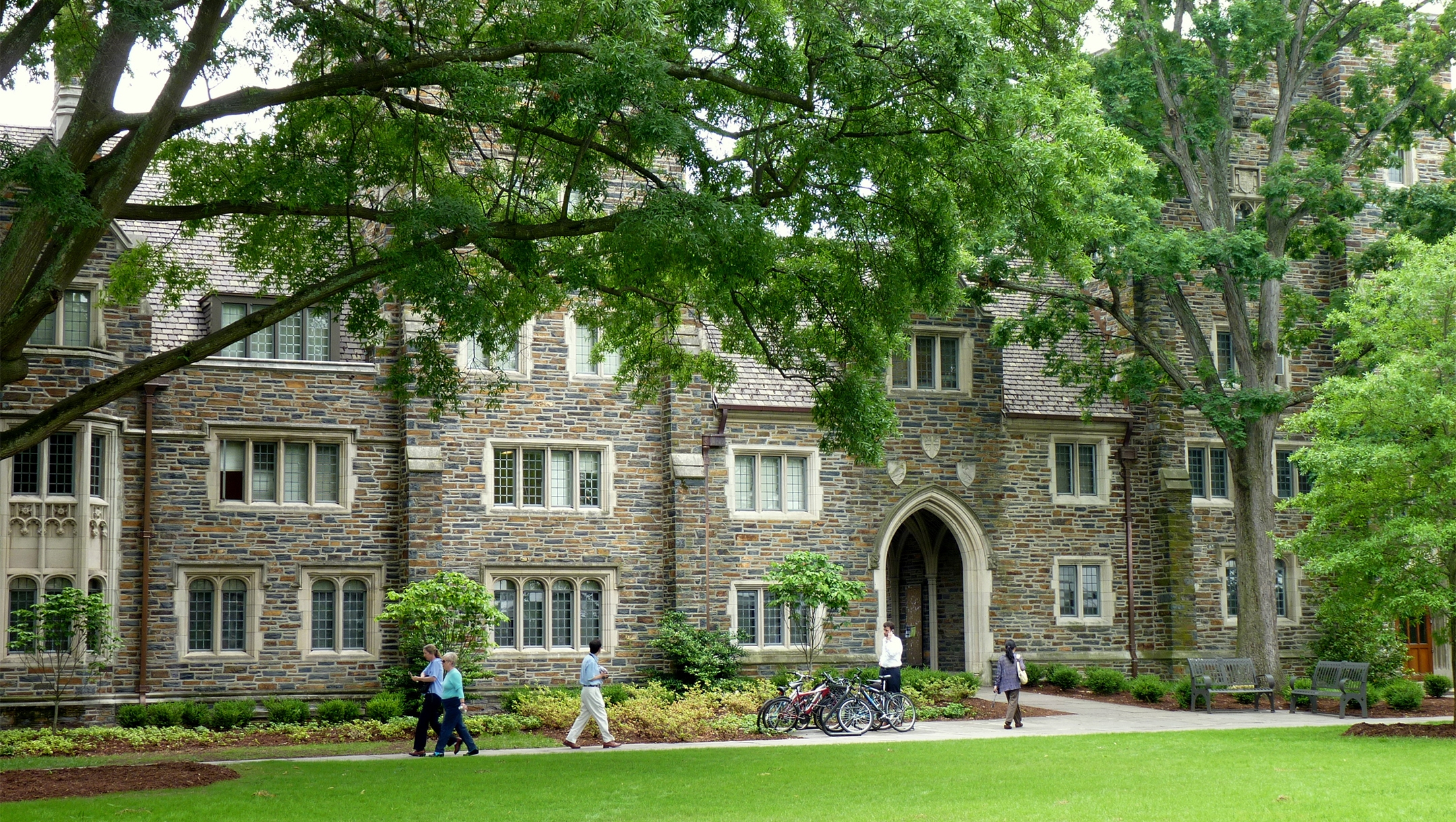
Duke has about 15,000 students, of whom about 1,700 of them this year are Jewish. (Wikimedia Commons)
At the school’s Chabad, some basketball fans call themselves the “Chabad Crazies,” according to Chabad Rabbi Nossen Fellig. “They’re all crazy about their basketball,” he said.
Throughout the weeks — yes, weeks — leading up to Duke’s games against major rivals, hundreds of students sleep in tents outside the Cameron Indoor Stadium on a patch of grass known as Krzyzewskiville, or K-Ville, in hopes of snagging tickets.
Barry was among those who endured dozens of frigid winter nights for a Duke-UNC game last season. (The teams split their outings during the regular season, then met again in the Final Four, when the Tar Heels ended Krzyzewski’s coaching career to go on to the final game.)
“It was six whole weeks,” Barry said. “You have to take two different tests about your Duke basketball knowledge — one on the current team and one on Duke basketball history — to determine whether or not you get a tent and what order you will sit in when you get into the stadium.”
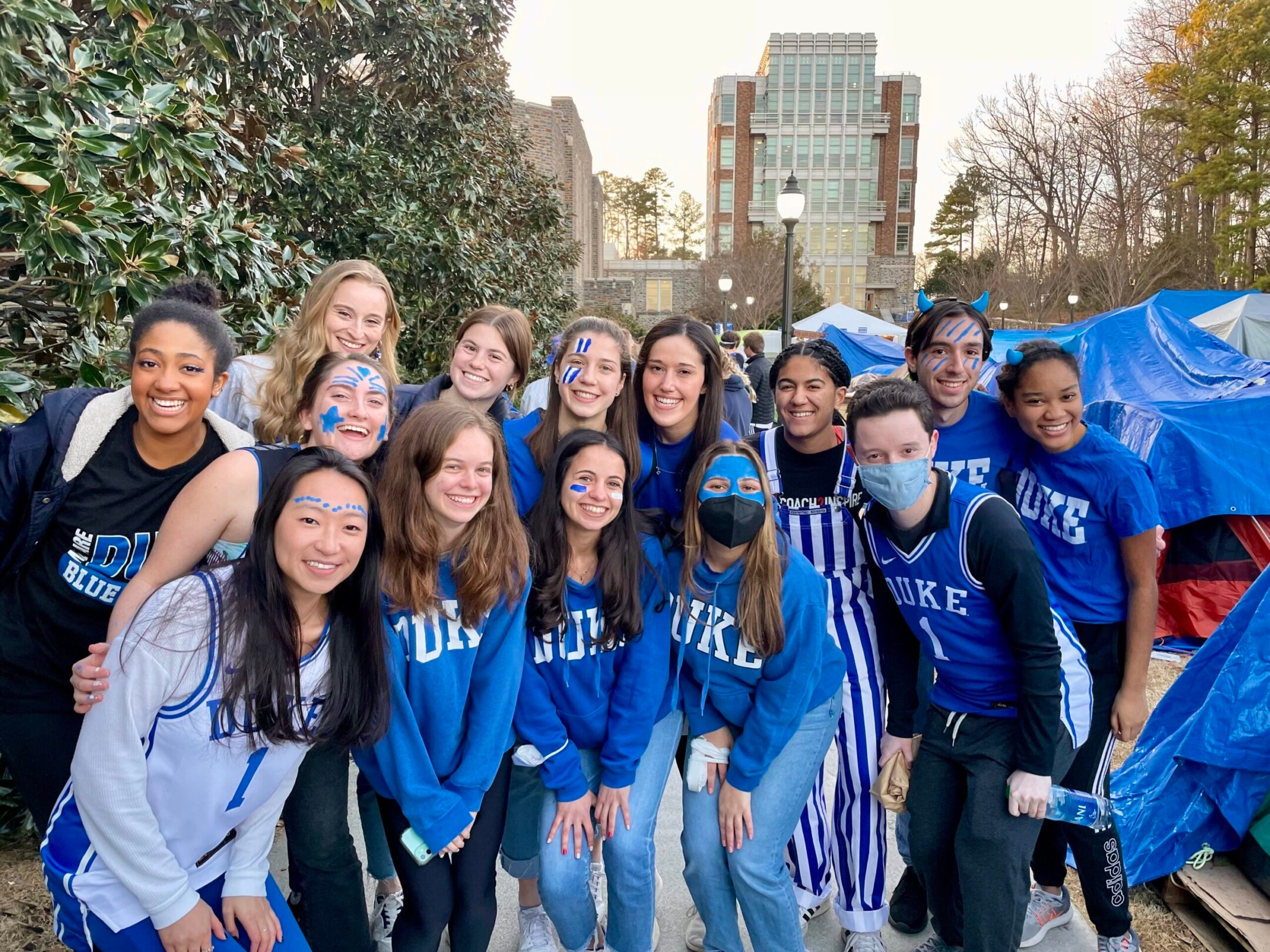
Students with Duke University’s Jewish Student Union wait to get into a men’s basketball team on campus. (Courtesy Sophie Barry)
While saying that Coach K was “the GOAT,” Barry was thrilled when Scheyer took his place. Before he was named the successor, Barry met the new coach during Hanukkah of 2020, when Scheyer appeared at a virtual menorah lighting for students secluded at home in the throes of the COVID-19 pandemic.
“Coach Scheyer got on and did this whole Q&A — from questions about how he celebrated Hanukkah growing up and celebrating it now with his two kids, to questions about whether he preferred sour cream or applesauce. It was a really cute event to lift the spirits during such a hard time,” Barry recalled. (Scheyer and his wife Marcelle, a nurse, have since added James to big siblings Noa and Jett.)
Joyce Gordon, director of Jewish life at Duke, said she has heard giddiness at the campus Hillel about the coach’s identity.
“Many Jewish students definitely have a sense of pride that Coach Scheyer is ‘one of us,’” said Gordon.
Fellig described Scheyer as a “mensch” and “dear friend to the Jewish community.” One summer before the pandemic, the coach requested Fellig’s help arranging kosher meals for a group of players that he was training in Israel. And at a recent Jewish event on campus, he brought a surprise.
“He surprised the students by giving them tickets to the game the next day, which was a pretty big game,” said Fellig. “He saved everyone the line — they would have had to wait for many hours.”
Geller, who hopes to clinch a job in an NBA front office after graduation, was high-spirited about his team’s March Madness prospects under Scheyer’s lead.
“The team has great momentum,” he said. “But the most exciting part is in the locker room [after the ACC tournament], they were all talking about [how] we’ve got to forget about this win tomorrow, because we don’t want to fall in the trap of being too excited. So I think they have a great mindset and great leadership.”
Correction: This story has been updated to reflect the fact that two Jewish coaches have led teams to NCAA championships in the past, not just one.
JTA has documented Jewish history in real-time for over a century. Keep our journalism strong by joining us in supporting independent, award-winning reporting.
